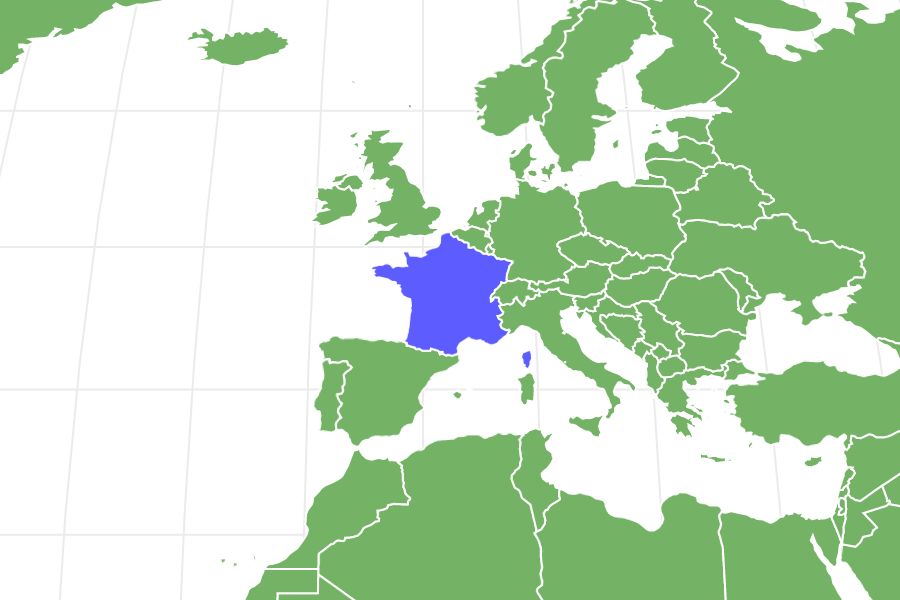Dogue De Bordeaux
Canis lupus
Extremely loyal and devoted to it's master!
Advertisement
Dogue De Bordeaux Scientific Classification
- Kingdom
- Animalia
- Phylum
- Chordata
- Class
- Mammalia
- Order
- Carnivora
- Family
- Canidae
- Genus
- Canis
- Scientific Name
- Canis lupus
Read our Complete Guide to Classification of Animals.
Dogue De Bordeaux Conservation Status
Dogue De Bordeaux Facts
Dogue De Bordeaux as a Pet:
- General Health
- Energy Level
- Shedability
- Trainability
- Intelligence
- Tendency to Chew
- Size
- Family and kid friendliness
- Yappiness / Barking
- Moderate
- Separation Anxiety
- Low
- Preferred Temperature
- Average climate
- Exercise Needs
- Moderate
- Friendly With Other Dogs
- Poor
- Pure bred cost to own
- $1,400 to $5,000
- Dog group
- Working
- Male weight
- 119-143 lbs
- Female weight
- 119-143 lbs
This post may contain affiliate links to our partners like Chewy, Amazon, and others. Purchasing through these helps us further the A-Z Animals mission to educate about the world's species.
View all of the Dogue De Bordeaux images!
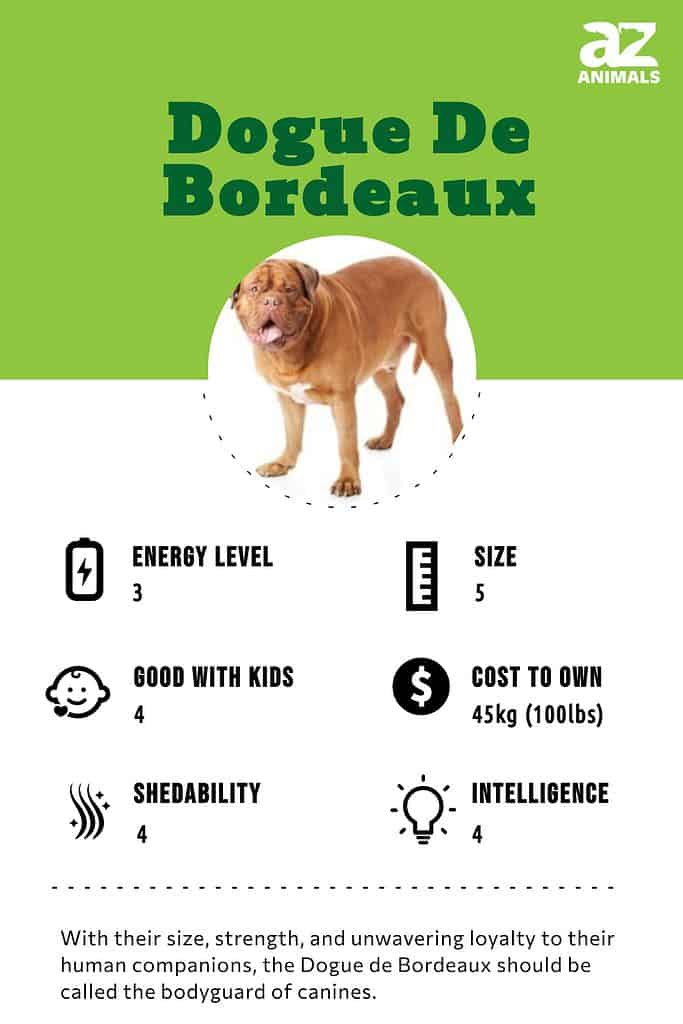
With their size, strength, and unwavering loyalty to their human companions, the Dogue de Bordeaux should be called the bodyguard of canines.
Also known as the French Mastiff, this ancient breed originates from the Bordeaux region of France. Due to their massive size, they were working dogs used to pull carts or as guard dogs. Since they have a similar appearance, some dog enthusiasts believe that they are a descendant of the Gaul, a larger Mastiff-type breed from that ancient Romans as war dogs and gladiator-style fighting dogs.
See all of our expert product reviews.
These days, a well-trained Dogue de Bordeaux makes an excellent choice for a family pet. Their laidback personality makes them great with children, while their fierce loyalty to their human companions ensures that their families will never be without protection.
3 pros and cons of owning a Dogue de Bordeaux
| Pros! | Cons! |
|---|---|
| Their laidback personality makes them a good fit for many families | They have an unfortunately short lifespan |
| They are extremely loyal to their masters | They drool more than most other breeds |
| They don’t need as much exercise as most other giant breeds | They don’t get along well with other pets |
Evolution and Origins
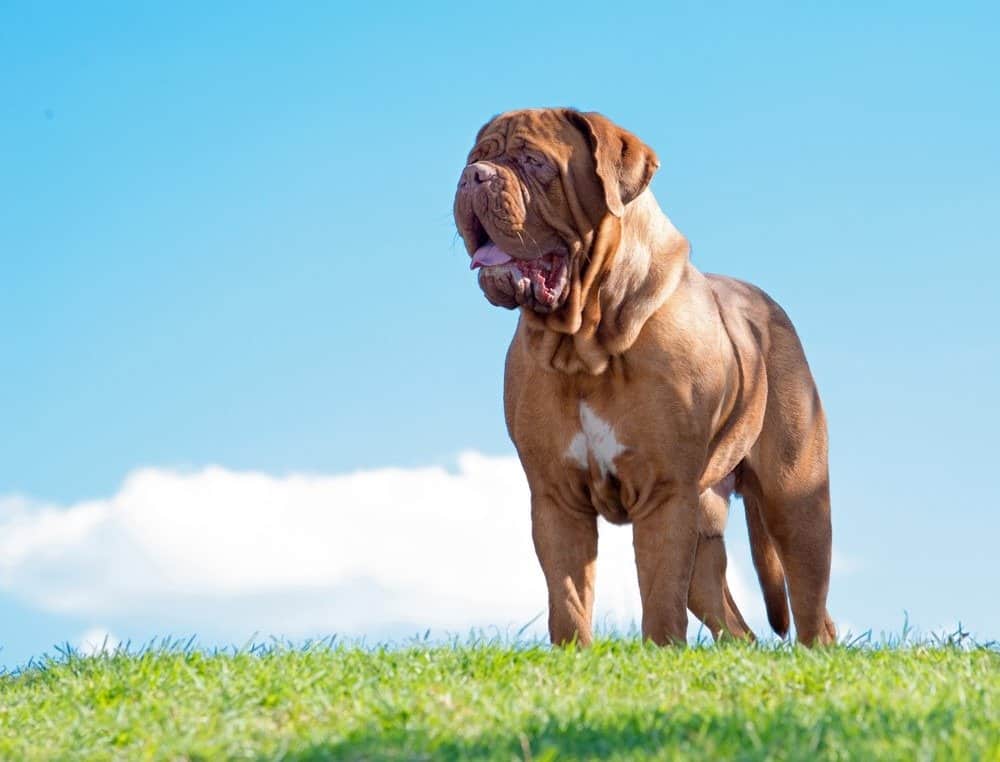
The Dogue de Bordeaux is believed to be the descendant of the Molossus or British mastiffs
©PardoY/Shutterstock.com
A breed of many names also known as the French Mastiff and Bordeaux Mastiff, this canine is considered to be the oldest in France. While its origins are somewhat shrouded in mystery, it is believed to be a descendant of the now-extinct Molossus. Other experts assert that its ancestors were bred as a result of the British presence in France when the former bred their mastiffs with local domestic canines. The Dogue de Bordeaux once earned its keep hunting game including bear and boar. By the 19th century, it had earned a reputation as an excellent guard dog and was employed watching over vineyards.
Around the Second World War, its numbers plummeted. Thankfully canine enthusiast Raymond Triquet working with the French Dogue de Bordeaux Club saved the breed. Between 1970 and 1995, the standard for the breed was established and refined, and it was eventually recognized by the American Kennel Club in 2008.
Health and Entertainment for your Dogue De Bordeaux
See all of our expert product reviews.
Size and Weight
This stocky, muscular dog breed ranges in height from 23 to 26 inches and weighs in at a whopping 100 pounds or more. As with most other breeds, the males tends to be slightly larger than the female.
Common Health Issues
One of the biggest health issues the dog faces is gastric dilatation and volvulus, which is the scientific term for serious bloating. To keep the stomach from getting too much air, you should pay special attention to habits before, during, and after feeding. These dogs should eat 2 to 3 small meals a day and avoid exercise an hour before and after eating. Raised dishes and ones designed to force dogs to eat slowly are best for this giant breed, and soft foods or soaked kibble help to reduce the amount of air they take in alongside their food.
These dogs can also fall victim to illnesses like epilepsy, hip dysplasia, heart disease and cancer. They are also extremely sensitive to anesthesia, so owners should choose a vet who is familiar with the breed.
In summary, the most important medical issues to watch for in a Dogue de Bordeaux are:
- Bloat
- Hip Dysplasia
- Heart Disease
- Epilepsy
Temperament
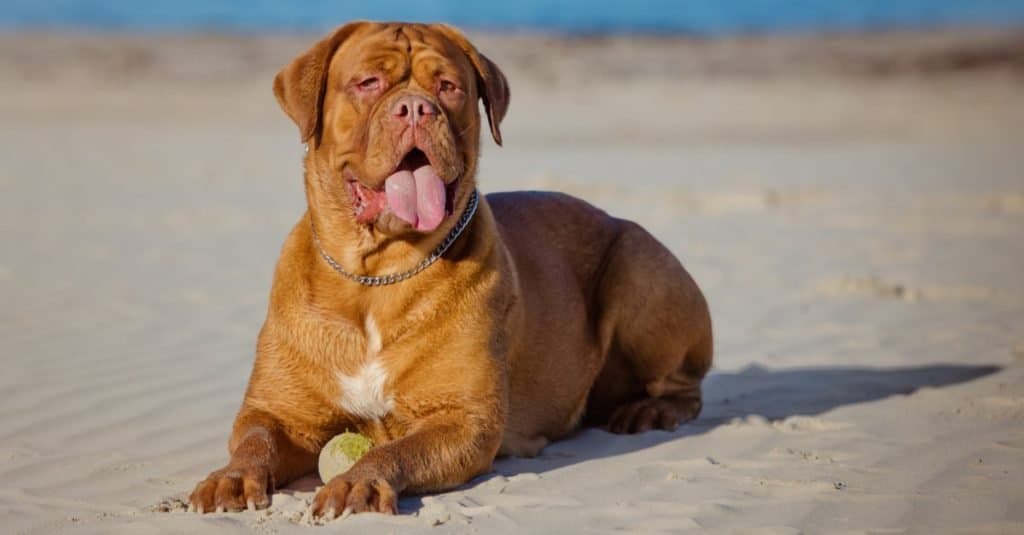
In spite of their affectionate nature, these pets are none too fond of other canines
©otsphoto/Shutterstock.com
The Dogue de Bordeaux is a loyal breed and will do whatever it deems necessary to protect its master. Proper training is imperative; without it, these dogs can pose a serious threat to unknown people and animals due to their extreme size and strength. If trained well, this breed will be protective but non-aggressive and will make a wonderful companion.
These dogs don’t get along with other dogs of the same sex and sometimes won’t even tolerate another dog of the opposite sex. They also have a strong prey drive and will chase and kill smaller animals like cats or rabbits. Since behavior modification in these areas is not foolproof, these traits make them best suited for a single-pet household.
When it comes to training, these dogs have a stubborn yet affectionate personality. They require a gentle but consistent approach that tells them who is boss without damaging their sensitive feelings.
How To Take Care of Dogue de Bordeaux
If you’re considering owning a Dogue de Bordeaux, you’ll need to consider their intense care needs. They require feeding modifications to keep them healthy, the right amount of exercise to stay healthy without overexertion and a trainer who is gentle but consistent to help them reach their full potential.
The Best Dog Food for the Dogue de Bordeaux
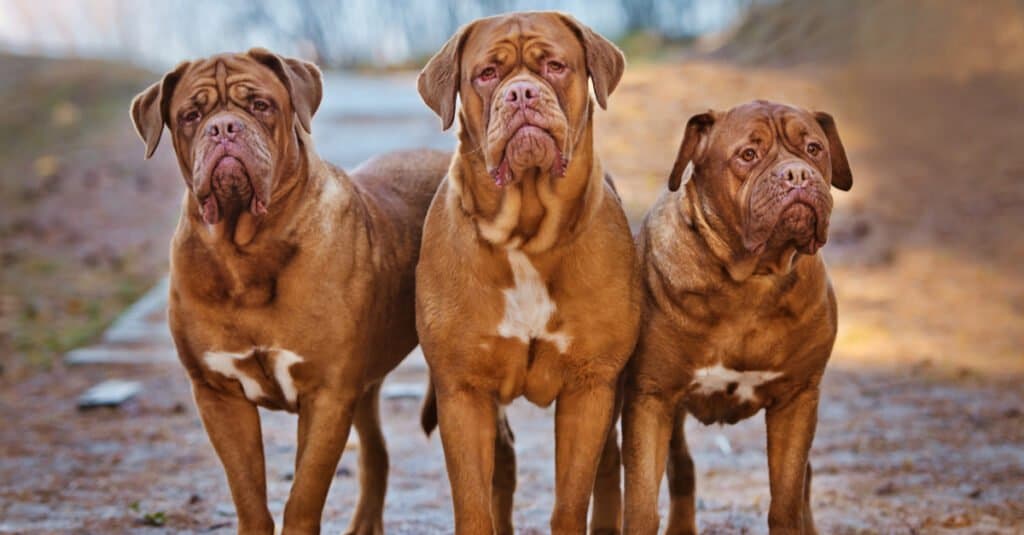
This breed is best suited to a legume-free diet owing to the fact that it is prone to heart disease
©otsphoto/Shutterstock.com
Due to their massive size, these dogs need to eat a lot. The average adult requires 4 to 7 cups of dry kibble every day. This breed tends to suffer from food allergies, which means they will need good quality wheat-free food. Prospective owners should take note of the cost required to keep these dogs sufficiently fed, as they can eat around 50 pounds of food each month.
Know about the breed’s elevated risk of heart disease, and make sure your dog doesn’t eat legumes, which are linked to heart failure in dogs. There are plenty of legume-free dog foods to compare.
For example, A-Z Animals thinks the best dog food for the Dogue de Bordeaux is Victor Super Premium Dog Food – Performance Dry Dog Food – 26% Protein.
This legume-free beef dog food suits the breed, because it’s packed with protein to keep this giant breed full and satisfied. Also, since these dogs can experience bloat, we like the digestive support including prebiotics and probiotics. The taurine for your dog’s heart is another big plus, while the glucosamine helps those joints hold up all that dog.
Check Chewy or Amazon for this product.
- 26% multi-protein, gluten free dry dog food
- Aids in dog's digestion, immune system function and healthy skin and coat
- Contains selenium yeast, prebiotics and probiotics, and mineral complexes for optimum health
Dogue de Bordeaux Maintenance And Grooming

This breed sheds a great deal and should be brushed weekly; its ears should also be cleaned at equal intervals of time too
©Vitaly Titov/Shutterstock.com
This breed, like all the others in the mastiff family, drools a lot. Since their faces have many wrinkles, owners of the Dogue de Bordeaux will need to check each day to make sure they are clean and dry to prevent infections. As with all floppy-eared dogs, owners should clean their ears every week. All dog owners should clip their pet’s nails and bathe them once a month. These dogs shed their short coats all year long, so owners should brush them every week to keep hair fall to a minimum.
Training
This is a very sensitive breed, so their owners should train them gently to build their trust. They also need lots of attention, so if you lead a busy life with minimal time for a domestic canine, this breed is not the right fit for your lifestyle. If left alone for too long they may become destructive when bored.
Exercise
This breed doesn’t need much exercise and should take it easy as puppies, so they don’t put too much strain on their developing bones and muscles; low-impact activities like swimming are best for them. As adults, the Dogue de Bordeaux can handle fairly strenuous activities; they were originally bred to pull carts. As with many other giant breeds, these dogs shouldn’t have too much exercise when it’s hot or humid outside to prevent overheating.
Puppies
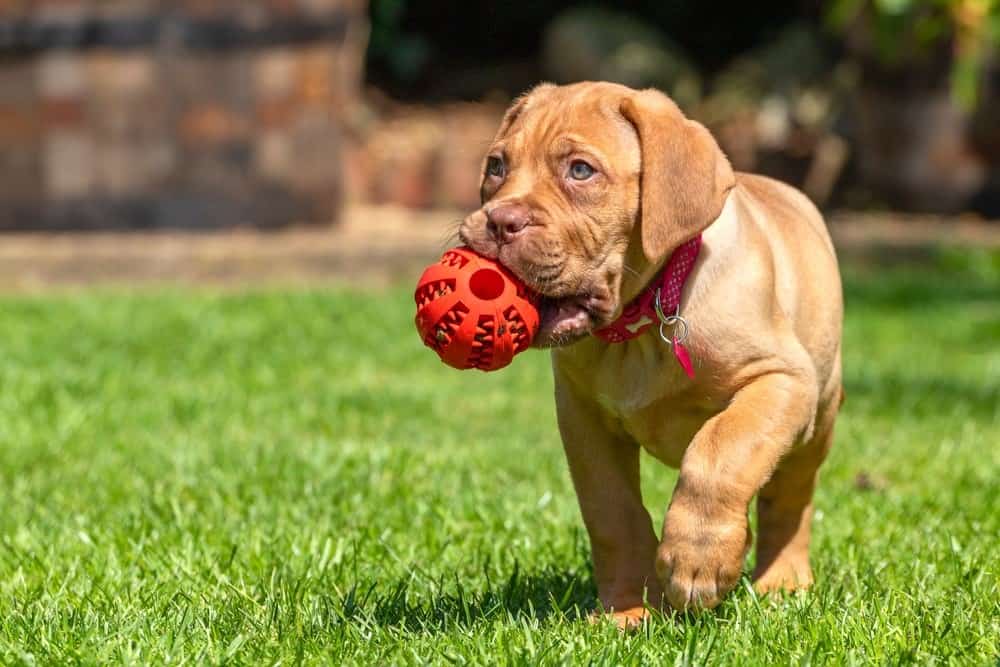
Dogue de Bordeaux puppies should be socialized at a young age
©Kev Gregory/Shutterstock.com
These puppies should avoid too much exercise to keep from putting too much pressure on growing bones and joints, so they tend to have a good deal of pent-up energy. This pent-up energy means puppies can be quite rambunctious and need lots of attention and supervision to keep them from being destructive.
Since these dogs can be wary of strangers, it’s important to socialize them at a young age. If they aren’t properly socialized, they can become fearful of people outside their family members. This fear could lead to aggression if not corrected promptly.
Children
The Dogue de Bordeaux’s famously laidback personality and love of affection make them wonderful companions for children. Despite these lovely qualities, they do require constant supervision with small children; like all giant breeds, they don’t realize how big they are and could unintentionally injure a child by being too rambunctious with them.
Dogs similar to Dogue de Bordeaux
If you’d like to have a dog that’s similar in size or personality to these dogs, you may want to consider breeds such as the Mastiff, the Neapolitan Mastiff, or the Bull Mastiff.
- Mastiff – The Mastiff, also known as the English Mastiff, is similar in size, personality, and energy level to the Dogue de Bordeaux but gets along better with other pets and has a slightly longer lifespan of 6 to 12 years.
- Neapolitan Mastiff
The Neapolitan Mastiff, nicknamed the Mastino, is similar in size and energy level to the Dogue de Bordeaux but has fewer health concerns, allowing them a slightly longer lifespan of 7 to 9 years. They are also more suited for living alongside other pets than the Dogue de Bordeaux. - Bullmastiff
The Bullmastiff is similar in size and personality to the Dogue de Bordeaux but has a higher energy level, making this breed a better fit for an owner with an active lifestyle. They also have a longer lifespan of 8 to 10 years.
Famous Dogue de Bordeaux
In 1989, the movie Turner and Hooch featured a Dogue de Bordeaux as the title character, Hooch.
Popular Names for Dogue de Bordeaux
Some popular names for the breed include:
- Thor
- Hooch
- Bruiser
- Bella
- Lela
- Rogue
Dogue De Bordeaux FAQs (Frequently Asked Questions)
What is a Dogue de Bordeaux?
The Dogue de Bordeaux is the oldest French breed of dog, and its name translates to “Mastiff of Bordeaux.” These huge, light-brown dogs are known to be incredibly affectionate, loyal and protective of their masters.
How much does a Dogue de Bordeaux cost?
If you plan to purchase a Dogue de Bordeaux from a breeder, you can expect to pay anywhere from $1,400 to $5,000 depending on pedigree. Since this breed is prone to extensive health issues, it’s important to find a reputable breeder.
If you’d like to get your pet from a rescue, there are dedicated Mastiff rescues that will allow you to adopt a Dogue de Bordeaux for a fraction of the cost of purchasing from a breeder. Rescues typically charge an adoption fee of $300 to $500 regardless of breed.
Are Dogue de Bordeaux dogs aggressive?
The Dogue de Bordeaux is not aggressive towards humans as long as it receives proper training and socialization from puppyhood. This breed does tend to be aggressive to other pets inside its home and would do best in a single-pet household.
Are Dogue de Bordeaux a good family dog?
Due to their laidback nature, low activity levels, and extreme loyalty to their owners, this breed makes an excellent family dog. Just be sure to keep an eye on them with small children; they don’t realize how big they are and could accidentally knock a little one over while playing.
How long does Dogue de Bordeaux live?
This breed has an unfortunately short lifespan; they only live for about 5 to 8 years.
Are Dogue De Bordeaux dogs herbivores, carnivores, or omnivores?
Dogue De Bordeaux dogs are Omnivores, meaning they eat both plants and other animals.
What Kingdom do Dogue De Bordeaux dogs belong to?
Dogue De Bordeaux dogs belong to the Kingdom Animalia.
What class do Dogue De Bordeaux belong to?
Dogue De Bordeaux belong to the class Mammalia.
What phylum to Dogue De Bordeaux belong to?
Dogue De Bordeaux belong to the phylum Chordata.
What family do Dogue De Bordeaux belong to?
Dogue De Bordeaux belong to the family Canidae.
What order do Dogue De Bordeaux belong to?
Dogue De Bordeaux belong to the order Carnivora.
What type of covering do Dogue De Bordeaux have?
Dogue De Bordeaux are covered in Hair.
What genus do Dogue De Bordeaux belong to?
Dogue De Bordeaux belong to the genus Canis.
What is an interesting fact about Dogue De Bordeaux?
The Dogue De Bordeaux is extremely loyal and devoted to it’s master!
What is the scientific name for the Dogue De Bordeaux?
The scientific name for the Dogue De Bordeaux is Canis lupus.
Thank you for reading! Have some feedback for us? Contact the AZ Animals editorial team.
Sources
- Tom Jackson, Lorenz Books (2007) The World Encyclopedia Of Animals
- David Burnie, Kingfisher (2011) The Kingfisher Animal Encyclopedia
- David Burnie, Dorling Kindersley (2008) Illustrated Encyclopedia Of Animals
- Dorling Kindersley (2006) Dorling Kindersley Encyclopedia Of Animals
- American Kennel Club, Available here: https://www.akc.org/dog-breeds/dogue-de-bordeaux/

